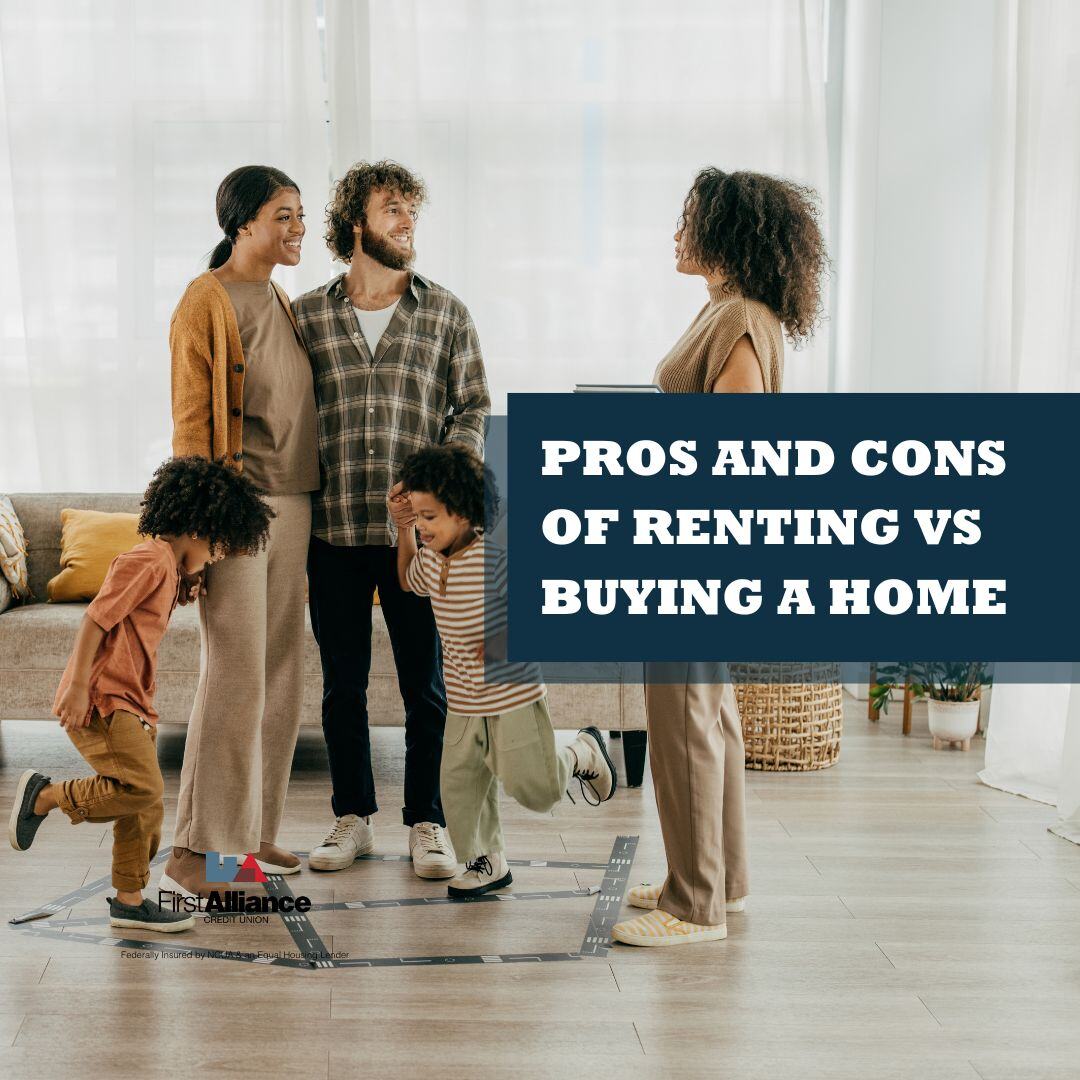5 Home Buying Mistakes to Avoid
Buying a new house is exciting, but it’s easy to be swept up in the process and make a mistake that might cost you thousands of dollars. Fortunately,...
3 min read
![]() First Alliance Credit Union
:
Oct 31, 2019 7:58:00 AM
First Alliance Credit Union
:
Oct 31, 2019 7:58:00 AM

Finding a place to live can be a daunting task. Many things go through your head when you make this decision. The first of which is probably “Should I buy a house or should I rent it?” Before you take the big leap, you must first decide which option is best for you.
While there are many things to consider before making your decision, the major factor that should influence your decision is how much you’re willing to spend. Renting and buying both have their advantages and disadvantages. Before making your choice, we recommend going through a list of pros and cons of renting and buying a home.

Before you choose to rent a place, you should consider a few fundamental items. Here are some pros and cons of renting a home.
You get more flexibility and freedom. You can make a quick decision to move out, especially if you have a month-to-month lease.
You have no responsibility to maintain the rented area. You can tell your landlord, and he or she will do all the repairs and maintenance for you.
Renting may be cheaper than owning a house. Also, because you aren’t footing the bill for repairs or maintenance, you know exactly how much you will be spending at the end of the month.
If you work or travel frequently, then renting a house or an apartment is the best decision as you won’t have to burden yourself with the responsibility of maintaining the property.
Your landlord can increase the rent at any time.
You cannot build equity if you’re renting a property. It will be your home, but it won’t be your asset.
There are no tax benefits to renting a property.
You cannot make any changes to your house or your apartment without your landlord’s approval.
Many houses available for rent have a “No Pets” policy. So if you’re an animal lover, finding a place to rent that allows pets can be hectic.
Your landlord can evict you at any time. They can put the property up for sale to make a profit if real estate values increase.
You are bound by the rules and obligations in your lease agreement.

Just like there are some benefits and disadvantages to renting a home, there are also several pros and cons to buying a home. The following list can help in making a final decision.
Owning a house can give you a feeling of stability and settlement. There is also the pride of owning a property.
There is complete freedom of redecorating and renovating the property as you are the owner.
Buying a house can serve as an investment. You can buy it and then rent it out to earn monthly profits.
There are also tax benefits homeowners can enjoy. You can deduct your mortgage interest payment. Plus, you build equity while paying off your loan.
You have complete freedom to live however you want. You can have pets, you can change appliances, you can renovate and much more without anyone stopping you.
You have your own privacy.
Owning a house requires more responsibility. You have to plan for home maintenance costs and make time to take care of household projects.
A home is not a liquid asset. This means that if you ever plan on selling your property, it may not be as quick of a process as you expect.
Although you don’t have to pay rent every month, property taxes can go up.
You can lose the value of your property over time instead of gaining it. You can end up selling a house you bought for $350,000 for the same exact price 20 years later. When considering inflation, this means you lost money on your investment.
If you are a restless soul, home ownership might not be for you as it provides less mobility.
Buying a house can be much more expensive than renting one.
Your monthly expenses may vary depending on what you need for the house. You might not spend much one month, but may end up spending $20,000 on roofing the next.
Although money plays the most important role in deciding whether to buy or rent a home, it is not just about the money. There are many other factors that play a part in deciding which to choose. How long you plan to live in a certain location, your plans for the future, your career goals, etc., all play a role in your decision.

Just make sure you’re willing to commit to long-term homeownership before making any decisions. If you think it’s time to settle down and start a family or build a career in a specific company or location, then you should start saving for a home.
If you still think that there is much to see in this world or if you aren’t sure about your career choices, then renting is most likely the best option for you, as it provides you with greater flexibility.
If you’re looking to buy a home, contact First Alliance Credit Union today. Our real estate lending advisors can help you get pre-qualified for a mortgage. During the process they will explain any mortgage fees and other costs you need to consider, such a homeowners insurance costs. Talk with our mortgage lending team and get a solution that works best for you.
.jpg)
Buying a new house is exciting, but it’s easy to be swept up in the process and make a mistake that might cost you thousands of dollars. Fortunately,...

Buying a home may signify different things for many different people. However, the most common of those things is the dream of owning a home, a place...

If someone were to invite you to live in a manufactured home (also referred to as a mobile home or trailer home), you would be forgiven for not...